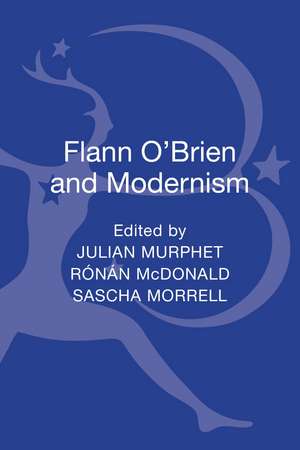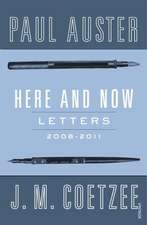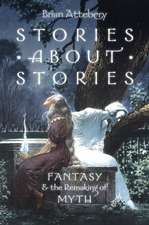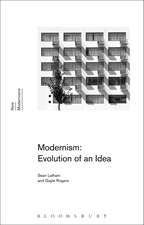Flann O'Brien & Modernism
Editat de Julian Murphet, Dr Ronan McDonald, Sascha Morrellen Limba Engleză Hardback – 24 sep 2014
Preț: 830.62 lei
Preț vechi: 1064.86 lei
-22% Nou
Puncte Express: 1246
Preț estimativ în valută:
158.98€ • 165.35$ • 133.23£
158.98€ • 165.35$ • 133.23£
Carte tipărită la comandă
Livrare economică 13-27 martie
Preluare comenzi: 021 569.72.76
Specificații
ISBN-13: 9781623564872
ISBN-10: 1623564875
Pagini: 248
Ilustrații: 8 halftone illus
Dimensiuni: 140 x 216 x 23 mm
Greutate: 0.43 kg
Ediția:New.
Editura: Bloomsbury Publishing
Colecția Bloomsbury Academic
Locul publicării:New York, United States
ISBN-10: 1623564875
Pagini: 248
Ilustrații: 8 halftone illus
Dimensiuni: 140 x 216 x 23 mm
Greutate: 0.43 kg
Ediția:New.
Editura: Bloomsbury Publishing
Colecția Bloomsbury Academic
Locul publicării:New York, United States
Caracteristici
Will allow students to situate O'Brien's work within wider critical questions about modernist literature
Notă biografică
Julian Murphet is Professor of Modern Film and Literature at the University of New South Wales, Australia. He is the author of Multimedia Modernism (2009), Literature and Race in Los Angeles (2001), co-author of Narrative and Media (2005), and co-editor of Literature and Visual Technologies (2003).Rónán McDonald holds the Australian Ireland Fund Chair in Modern Irish Studies and is Director of the Global Irish Studies Centre at the University of New South Wales, Australia. His recent publications include Tragedy and Irish Literature: Synge, O'Casey, Beckett (2002), The Cambridge Introduction to Samuel Beckett (2006), and a special issue of the Yearbook of English Studies (2005) on 'Irish Writing since 1950'.Sascha Morrell is Lecturer in English Literature at the University of New England, Australia. She studied at the University of Cambridge and has broad interests in 19th and early-20th Century American, British and 'Antipodean' literatures.
Cuprins
AcknowledgementsContributorsIntroductionRónán McDonald, University of New South Wales, Australia and Julian Murphet, University of New South Wales, AustraliaChapter 1 Making Evil, with Flann O'BrienSean Pryor, University of New South Wales, AustraliaChapter 2 Mythomaniac modernism: lying and bullshit in Flann O'BrienJohn Attridge, University of New South Wales, AustraliaChapter 3 'The outward accidents of illusion': O'Brien and the TheatricalStefan Solomon, University of Sydney, AustraliaChapter 4 The Ghost of 'Poor Jimmy Joyce': A Portrait of the Artist as a Reluctant ModernistStephen Abblitt, La Trobe University, AustraliaChapter 5 'Do You Know What I'm Going to Tell You?': Flann O'Brien, Risibility and the Anxiety of InfluenceDavid Kelly, University of Sydney, AustraliaChapter 6 An Béal Bocht, Translation and the Proper NameMaebh Long, University of the South Pacific, FijiChapter 7 Ploughmen Without Land: Flann O'Brien and Patrick KavanaghJoseph Brooker, University of London, United KingdomChapter 8 Flann O'Brien's Ulysses: Marginalia and the Modernist MindDirk Van Hulle, University of Antwerp, BelgiumChapter 9 'Truth is an Odd Number': Flann O'Brien and Infinite ImperfectionBaylee Brits, University of New South Wales, AustraliaChapter 10 'An astonishing parade of nullity': Nihilism in The Third PolicemanRónán McDonald, University of New South Wales, AustraliaChapter 11 Flann O'Brien and Modern Character Julian Murphet, University of New South Wales, AustraliaChapter 12 'No unauthorized boozing': Flann O'Brien and the Thirsty MuseSam Dickson Chapter 13 Soft drink, hard drink, and literary (re)production in Flann O'Brien and Frank MoorhouseSascha Morrell, University of New England, AustraliaChapter 14 Flann O'Brien's Aestho-AutogamyMark Steven, University of New South Wales, AustraliaChapter 15 Modernist WheelmenMark Byron, University of Sydney, Australia
Recenzii
The essays in the collection do a good job of showing how O'Brien's work should be read within the context of trans-European modernism.
Flann O'Brien often denounced modernism but with a vehemence that was a kind of homage. This collection of essays, in exploring that uneasy but deep relationship, offers a wholly new perspective on his writings and one which goes well beyond the fall-back of treating them as a project on the fringes of Irish literature. In a sequence of deft, original, sometimes astounding studies, the authors take O'Brien's work as a test-case of the modern world. In their analyses, they go well beyond all narrowing models of Irish Studies and at the same time challenge and complicate many received paradigms of modernism. The result is an audacious and satisfying book. More than a collection of random essays on an eccentric, this volume suggests that the eccentric may simply be the person with a deeper than average understanding of what passes as normality. It is a major addition to the developing debate about Flann O'Brien.
Some day in a civilized world there will be a Comic's Corner in the Cathedral of Great Literature and Flann O'Brien will occupy an honourable place there. He remains for now an enigmatic figure, enjoying cult rather than canonical status, and possessed of so many variable and unstable identities as to be finally elusive. Elegantly introduced and intelligently developed, this study delivers many sharp and timely critical takes on O'Brien's evolving narrative styles and fixed obsessions. The writer that emerges here is an internationally-minded late modernist vertiginously distracted and delighted in the maze (without exit) of Irish fiction and the fictions of Irishness.
Reluctant modernist' or 'devilish apostate': this collection powerfully and decisively reassesses the relationship of Flann O'Brien to literary modernism. It marks a particularly significant contribution in refusing the binaries that can constrict an appreciation of O'Brien, who now rightly emerges as Irish and European, local and international, journalist and novelist. Most welcome of all, it reminds its readers of the recalcitrant, the comic, the gleeful, the subversive--and all that makes Flann O'Brien worth reading.
Through a series of well-considered interventions, the essays collected here succeed both in advancing the Irish modernist goal "to reveal not only the importance of modernism to Ireland, but also of Ireland to modernism" and in demonstrating the untapped potential of O'Nolan's mercurial, multi-genre writing for the future of new modernist inquiry. . The strong case that O'Nolan's unruly art recasts modernism's vestiges amid shifts in the field makes this collection highly recommended not only to O'Nolan scholars but also to those with a broader interest in Irish and (new) modernist studies. Indeed, liberated from calcified myths, O'Nolan's work emerges as an important coordinate against which to reconsider commonplaces about Joyce's own place in the modernist canon.
Flann O'Brien often denounced modernism but with a vehemence that was a kind of homage. This collection of essays, in exploring that uneasy but deep relationship, offers a wholly new perspective on his writings and one which goes well beyond the fall-back of treating them as a project on the fringes of Irish literature. In a sequence of deft, original, sometimes astounding studies, the authors take O'Brien's work as a test-case of the modern world. In their analyses, they go well beyond all narrowing models of Irish Studies and at the same time challenge and complicate many received paradigms of modernism. The result is an audacious and satisfying book. More than a collection of random essays on an eccentric, this volume suggests that the eccentric may simply be the person with a deeper than average understanding of what passes as normality. It is a major addition to the developing debate about Flann O'Brien.
Some day in a civilized world there will be a Comic's Corner in the Cathedral of Great Literature and Flann O'Brien will occupy an honourable place there. He remains for now an enigmatic figure, enjoying cult rather than canonical status, and possessed of so many variable and unstable identities as to be finally elusive. Elegantly introduced and intelligently developed, this study delivers many sharp and timely critical takes on O'Brien's evolving narrative styles and fixed obsessions. The writer that emerges here is an internationally-minded late modernist vertiginously distracted and delighted in the maze (without exit) of Irish fiction and the fictions of Irishness.
Reluctant modernist' or 'devilish apostate': this collection powerfully and decisively reassesses the relationship of Flann O'Brien to literary modernism. It marks a particularly significant contribution in refusing the binaries that can constrict an appreciation of O'Brien, who now rightly emerges as Irish and European, local and international, journalist and novelist. Most welcome of all, it reminds its readers of the recalcitrant, the comic, the gleeful, the subversive--and all that makes Flann O'Brien worth reading.
Through a series of well-considered interventions, the essays collected here succeed both in advancing the Irish modernist goal "to reveal not only the importance of modernism to Ireland, but also of Ireland to modernism" and in demonstrating the untapped potential of O'Nolan's mercurial, multi-genre writing for the future of new modernist inquiry. . The strong case that O'Nolan's unruly art recasts modernism's vestiges amid shifts in the field makes this collection highly recommended not only to O'Nolan scholars but also to those with a broader interest in Irish and (new) modernist studies. Indeed, liberated from calcified myths, O'Nolan's work emerges as an important coordinate against which to reconsider commonplaces about Joyce's own place in the modernist canon.














